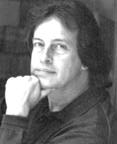Killing Time
Black and white: Liberatore thinks 'A Time to Kill' simplifies racial issues.
Paul Liberatore mocks this bird
By David Templeton
NOW THAT was a powerful flick," Paul Liberatore declares, seating himself on a weathered bench outside a neon-bedecked theater. "It was an accurate reflection of a culture that's immersed in racism, a movie that really holds up well." We have just seen A Time to Kill, the latest cinematic cash cow to be based on a John Grisham novel, starring Samuel L. Jackson as a black man on trial in Mississippi for the murder of the men who raped his daughter.
The film my guest is praising, however, is 1962's To Kill a Mockingbird, and there is no more telling an indication that a movie has failed than when you leave the theater brimming with kind words for an entirely different film.
"Compared to Mockingbird," Liberatore says, "this thing we just saw is nothing. It's empty and meaningless. It's insulting and irritating."
Liberatore is the author of a controversial new book that examines a significant series of events in the history of American racial politics. The Road to Hell: The True Story of George Jackson, Stephen Bingham, and the San Quentin Massacre (Atlantic Monthly Press, 1996) is a probing reconstruction of the circumstances surrounding the prison-grounds death of Jackson, the legendary Black Panther field marshal and the author of the prisoners-rights classic Soledad Brother.
"You know what I was wondering while watching this?" Liberatorenow asks. "I've never lived in Mississippi, so I don't know for sure, but I wonder if it's really like that. Do they flaunt the Confederate flag in courtrooms, with the whites sitting on one side and blacks sitting on the other? How can that be accurate? It's like it was set in the '60s or something." We consider the possibility that the film was, in fact, intended to take place in the '60s, though the star's adornment of a Prince T-shirt would somewhat belie that.
(Later, I called up the District Attorney's Office in Jackson, Miss. "No, Confederate flags are not flown in our courtrooms," I was assured by his assistant. "And black and white people are not segregated in the courtroom either. We've come a little bit further than that!")
"The worst part is the message of the movie, which is this that it takes a young, handsome, smart, white lawyer to free a black man." Liberatore continues. "That's the bottom line of this film. It wasn't a black lawyer doing it, or a team of black lawyers. The political people, the NAACP, are portrayed as a bunch of self-serving crooks. But the young white lawyer working on his first major case, he can do it. To me that's the worst kind of racism."
But the accused black man does tell his lawyer that the reason he chose him was that, as a white man, he'd be able to "think like the enemy."
"That was kind of interesting," Liberatore admits. "But it was still white people to the rescue. Black people can't intelligently consider the thought processes of an all-white jury?" he asks rhetorically. "They can't figure out how to defend themselves?"
On the other hand, as Liberatore reports in his book, George Jackson had a whole team of white lawyers, including Stephen Bingham, the man who was accused of smuggling Jackson the gun that figured in the bloody San Quentin uprising. He admits that Jackson's ability to work with whites as well as blacks was one of the things he most admired about him.
Liberatore nods. "The Panthers, back then, they mostly had white lawyers," he says. "But that was 25 years ago. There weren't a lot of African American lawyers to choose from. There weren't even very many African Americans on the police department back then.
"But we're talking about this movie all wrong," he interrupts himself. "We're talking like it's about race, and it's not. The race thing is just something that was imposed on top of a film about vigilante justice. This movie advocates murder. It advocates going outside the system. It advocates anarchism. The issue here is: If someone harms your child, do you have the right to go out and kill them dead?
"This movie says you do, and then it throws on all the can-a-black-man-get-a-fair-trial stuff, just to make it seem less reactionary. And then it parades out a bunch of cartoonish black characters who are these clichéd Po' Folks." He forces out a chuckle. " I don't think it's going to do very much to foster race relations in this country, that's for sure."
[ Sonoma | MetroActive Central | Archives ]
This page was designed and created by the Boulevards team.

Jocelyn Knight
Writer David Templeton takes interesting people to interesting movies in a quest for the ultimate post-film conversation. This time out, he takes reporter Paul Liberatore, author of the controversial The Road to Hell, to see the vigilante flick A Time to Kill.
From the August 22-28, 1996 issue of the Sonoma Independent
Copyright © 1996 Metrosa, Inc.
![[MetroActive Movies]](/gifs/ma-movies.gif)